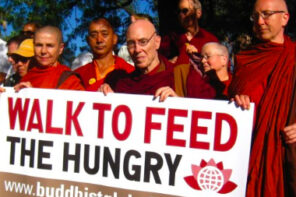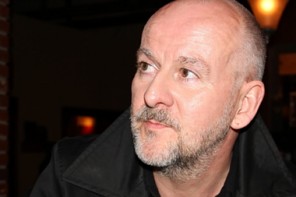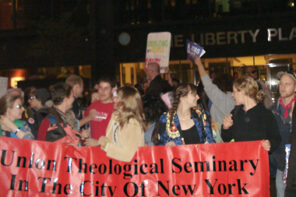Friday night is Erev Yom Kippur, and a Kol Nidre service is scheduled to be held in Zuccotti Park, site of the Occupy Wall Street protests. RD Senior Editor Sarah Posner spoke with Daniel Sieradski, the organizer of the service, who has been described as “a major figure of the Jewish Internet world and a cultural trailblazer” by the Jewish Daily Forward.
Sieradski, the former publisher of Jewschool, is a cause media entrepreneur whose current project is Jew It Yourself: The Every Day Guide to Do-It-Yourself Jewish Living. In addition, Sieradski is a writer, photographer, filmmaker, and designer whose work explores themes of post-normative Jewish cultural expression.
I see from the Facebook page you put up for the Kol Nidre minyan at Occupy Wall Street that you already have more than enough people for minyan. To your knowledge, is this the very first Kol Nidre service in the history of the world that takes place in solidarity with a protest against economic injustice and was organized via social media?
It’s definitely not the first Jewish service to take place at a protest, but a Kol Nidre service at an economic protest organized over Twitter, Tumblr, and Facebook? Yes. Quite likely a first. It’s also super exciting to see such an incredible response.
Kol Nidre is the evening service of the holiest Jewish holiday, Yom Kippur. These Aramaic words mean “all vows,” and in the Kol Nidre service the cantor recites the declaration [it’s not, strictly speaking, a prayer] that asks to make all vows null and void. How would you contextualize this in Zuccotti Park?
Zach Teutsch, a labor organizer in DC, composed this text, which I will be reading at our service:
On Kol Nidrei night we say:
All personal vows we are likely to make, all personal oaths and pledges we are likely to take between this Yom Kippur and the next Yom Kippur, we publicly renounce. Let them all be relinquished and abandoned, null and void, neither firm nor established. Let our personal vows, pledges and oaths be considered neither vows nor pledges nor oaths.
Under normal circumstances, we view these words as speaking about our own spiritual commitments—but we aren’t under normal circumstances. Kol Nidrei reminds us that though we make commitments under duress, ultimately we are accountable only to the higher values of Justice and Righteousness. These words were said by Jews who were forced to convert under pain of death in Spain hundreds of years ago, and more recently by our gay brothers and sisters who couldn’t yet live the truth of their identities.
Today, we are thinking about a different kind of commitment made under duress. A big part of our financial crisis was caused by a banking system which misled and pressured, which up-sold and implored us to sign without reading, where fraud was rampant, and where caution was absent. Because of those external problems, many good hardworking people were steered, under a sort of duress, into financial doom while their futures were sold from the rich to the richer.
Today, as we think about how commitments must be contemplated in the context of right and wrong, of earth and heaven, we know that those notes have no moral weight, that banks can’t and shouldn’t own the futures of people who work, and that it’s time for the bankers to abandon their claims on everyday people’s futures. I will leave it to another [on this day] to think about what this means practically or what policies we should adopt as a country. For today, we should think about the moral content of promises, oaths, commitments, and pledges. Is it right to follow through on these? Is it right to own another’s future?
The Kol Nidre service opens with a statement declaring it lawful to pray with transgressors. Will this hold any particular meaning for you while praying near Wall Street?
Well, we’re not really praying with those transgressors. But those of us protesting economic injustice should look to ourselves as transgressors as well. As participants in capitalism—as shareholders, bosses, workers, consumers, and voters—we too are responsible for the present state of the economy and its inequities and iniquities. We’re the ones who use corporate banks and credit cards, take loans we can’t pay back, buy products from and invest in tax-evading multinational corporations, and vote for jerks who put special interests before the public interest. Which is not to say those in power do not have a greater responsibility to the public good. We ourselves have [plenty] to atone for. We have our own sins for which we are culpable.
On the Facebook page, you write, “is fasting and beating our chests really the best we can do to redeem ourselves?” The answer, for you, is obviously no, and you cite the prophet Isaiah: “Is not this the fast that I have chosen? To loose the fetters of wickedness, to undo the bands of the yoke, and to let the oppressed go free, and that ye break every yoke?” Can you explain how Kol Nidre at Occupy Wall Street is consistent both with Isaiah’s fast and the Yom Kippur fast?
Isaiah said, sure, you could afflict yourself by not eating for a day and wearing sackcloth and rubbing yourself in ashes. But if you live a life of injustice, who cares? The vast majority of Jews are not religiously observant, but even for the ones who are—what? You’re going to fast once, a couple of times a year and you think that makes you a better person? Or the world a better place?
True repentance means making real changes in the way you lead your life. Today we lead our lives stepping over homeless people and demanding a lower marginal tax rate so we don’t have to share our affluence with the poor. A real fast—a fast of Isaiah—is one in which you fast from your capitalist lifestyle and pour out love and compassion for your fellow man, putting people over profit. A real fast is one in which you must actually change something about your life. And that’s a far heavier lift than not eating for 24 hours.
Is fasting essential?
Fasting from food? If you’re into spiritual asceticism. Once you get to the point of hallucination from hunger, it can be quite revelatory. But, it’s inessential in my opinion. Fasting like Isaiah? That is the most necessary task set before humanity today.
I’m assuming you won’t have an ark and Torah in Zuccotti Park. Is this kosher?
We’re actually working on trying to get a Torah. You can actually substitute an ark with a blanket and cover, and uncover the Torah as needed.
Who is going to lead the service?
We have a couple of volunteers so far—a Jewish musician and a rabbinical student—who have stepped up to the plate.
Will there be a drum circle? (Kidding!)
Actually, we may have to see if we can get them to not drum for an hour and a half while we pray.
Do you know of a similar service in Israel, tied to the July 14 protests there?
Nope. I’m sure there was davening three times a day among the Orthodox participants.
Since, as you point out, Yom Kippur is not just about individual repentance, but collective repentance, do you think participating in the Kol Nidre service amid the Occupy Wall Street protest could change the way people interpret the meaning of Yom Kippur, and the meaning of sin and repentance?
I think it could have revolutionary power to transform the way we relate to Jewish practice overall, so that it is seen more as a form of social action and not merely the stoking of an invisible ego in the sky. A blogger named Matt Stoller wrote a post the other day saying Occupy Wall Street isn’t a protest, but a church of dissent. I’d like to think of Judaism as the first church of dissent—and one that needs to reassert itself as a social justice tradition.




